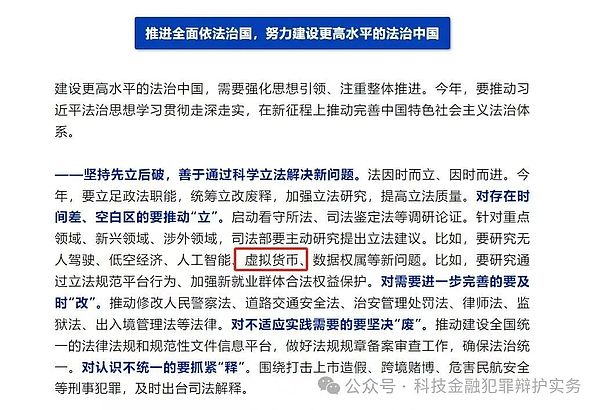From January 12 to 13, the Central Political and Legal Work Conference was held in Beijing. On the 14th, the "Central Political and Legal Committee Chang'an Sword" public account released a meeting report, in which the chapter "Promoting the comprehensive rule of law and striving to build a higher level of rule of law in China" mentioned: Initiate research and demonstration on the Detention House Law and the Forensic Identification Law. For key areas, emerging areas, and foreign-related areas, the Ministry of Justice should take the initiative to study and put forward legislative suggestions. For example, it is necessary to study new issues such as unmanned driving, low-altitude economy, artificial intelligence, virtual currency, and data ownership.

I have read many articles that believe that the so-called legislative suggestions may be related to the legal attributes of virtual currency and other issues. I personally believe that the above conclusion cannot be drawn from this notice for three reasons:
First, we must understand the functions and roles of the Ministry of Justice. The Ministry of Justice has many functions and roles, but the ones related to virtual currency are mainly judicial appraisal. I personally believe that the legislative suggestions studied and proposed by the Ministry of Justice must be based solely on its own functional positioning, and it is impossible to go beyond its own responsibilities to do what the two high courts, one ministry, and even the central bank and other financial departments should do.
Second, this meeting is the Central Political and Legal Work Conference, that is, a meeting led by the superior departments of the public security, procuratorate, courts, and justice departments. The notice of this kind of meeting usually does not reflect the specific departments of the lower level. You can take a look at this notice. Except for the mention of "Ministry of Justice", the rest of the content does not contain expressions such as "Public Security Department", "People's Procuratorate", "People's Court", etc. If you ask me to guess why, I think it may be a problem with proofreading? Removing the words "Ministry of Justice" is more in line with the style of the notice. People who have worked in the system should have a better understanding of this. Of course, if these words were removed, people in the circle might have more room for imagination.
Third, some of the content in the context has nothing to do with the duties of the Ministry of Justice, such as the "Detention House Law". The 2017 draft for comments has made it clear that the public security organs are still in charge. Another example is "amending the People's Police Law, the Road Traffic Safety Law, and the Public Security Administration Punishment Law", which are not within the scope of the Ministry of Justice's functions. Therefore, since it has been emphasized that the Ministry of Justice should do what it wants to do, it must be limited to its scope of functions.
Writing this, I really think there are some minor flaws in the proofreading?
Let's go back to what I just said. If the Ministry of Justice is conducting research and demonstration on the Judicial Appraisal Law, the content involves how to conduct judicial appraisal of virtual currency. This is in line with the current status of judicial practice and is also an issue that urgently needs to be resolved. In cases involving virtual currency, it has dual attributes. On the one hand, it is a type of electronic data and can be used as evidence and can be subject to judicial appraisal. On the other hand, if it is considered to have property attributes, the appraisal of its value does not fall within the scope of judicial appraisal. However, in practice, especially when it comes to the determination of property crimes, the prosecution and the defense have different views on the value of the virtual currency involved. Judicial appraisal agencies often make determinations on the value of virtual currency, which is essentially inconsistent with the relevant provisions of judicial appraisal. It is hoped that the Ministry of Justice's research and demonstration on the Judicial Appraisal Law and the legislative suggestions on virtual currency can solve practical problems.
Finally, in 2025, the Supreme People's Court and some local high courts have already conducted research on the disposal of virtual currencies. Combined with my recent participation in some meetings and forums, I still stick to my previous view that the breakthrough of virtual currencies in legal practice is likely to be tried first from judicial disposal. Whether the legal attribute of virtual currencies is data or property, I am afraid it will take some time for controversy and argumentation. As for the recognition of legal transactions of virtual currencies that currency friends expect, I think the conditions are not met at this stage. Judging from the crime situation in 2024 reported by the judicial authorities a while ago, the focus was on the use of virtual currencies for currency exchange and money laundering. Currency exchange crimes have affected the country's foreign exchange management. As for money laundering crimes, they will face the assessment of FATF next year. I really can't think of any reason to liberalize virtual currency transactions.
 Aaron
Aaron
 Aaron
Aaron Aaron
Aaron Hui Xin
Hui Xin Jixu
Jixu Jixu
Jixu Jixu
Jixu Hui Xin
Hui Xin Aaron
Aaron Aaron
Aaron Aaron
Aaron